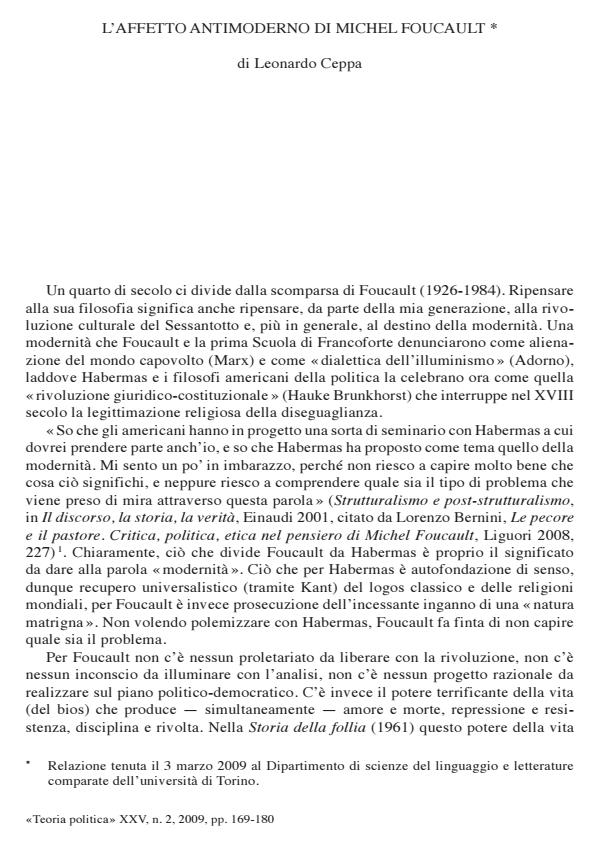L'affetto antimoderno di Michel Foucault
Titolo Rivista TEORIA POLITICA
Autori/Curatori Leonardo Ceppa
Anno di pubblicazione 2009 Fascicolo 2009/2 Lingua Italiano
Numero pagine 12 P. 169-180 Dimensione file 130 KB
DOI 10.3280/TP2009-002009
Il DOI è il codice a barre della proprietà intellettuale: per saperne di più
clicca qui
Qui sotto puoi vedere in anteprima la prima pagina di questo articolo.
Se questo articolo ti interessa, lo puoi acquistare (e scaricare in formato pdf) seguendo le facili indicazioni per acquistare il download credit. Acquista Download Credits per scaricare questo Articolo in formato PDF

FrancoAngeli è membro della Publishers International Linking Association, Inc (PILA)associazione indipendente e non profit per facilitare (attraverso i servizi tecnologici implementati da CrossRef.org) l’accesso degli studiosi ai contenuti digitali nelle pubblicazioni professionali e scientifiche
Foucault’s anti-modern effect - According to the author, two different approaches to modernity are now competing. The first one (coming from Schopenhauer and Nietzsche) underlines the irrational and voluntaristic nature of any moral code and political power. The second one (coming from Rousseau and Kant) grounds progress and legitimacy upon democratic, legal and moral universalism. Foucault's philosophy of life belongs to the first of these approaches. This is where the clash with Habermas, belonging to the second approach, becomes poignantly significant. At first, for Foucault, the power of sovereignty represses life, whereas insanity and madness preserve a transcendent meaning of liberation. Later on, life moulds the inside like a pleat of the outside, subjectivity becomes an effect of power. In Foucault's anti-humanism, Man and God die together like far gone delusions that are recaptured into nature. Schopenhauer's compassion becomes sharp diagnosis of the many tortures inflicted upon man's body, whereas Zarathustra's heroism becomes on the one hand neo-stoical aesthetics of existence and on the other political revolutionary anarchism.;
Leonardo Ceppa, L'affetto antimoderno di Michel Foucault in "TEORIA POLITICA" 2/2009, pp 169-180, DOI: 10.3280/TP2009-002009